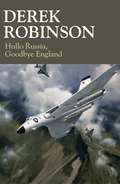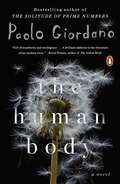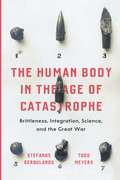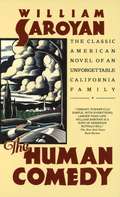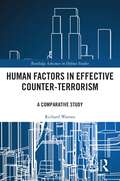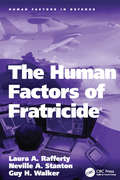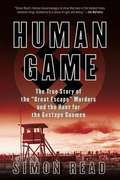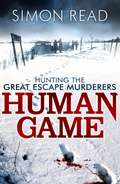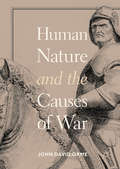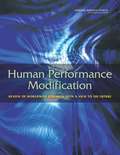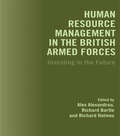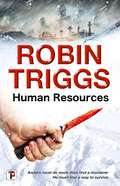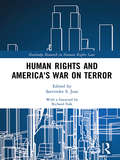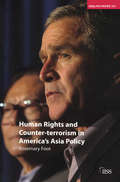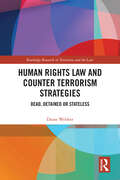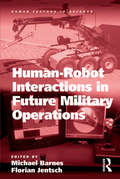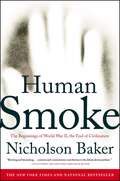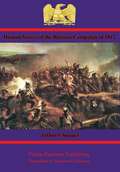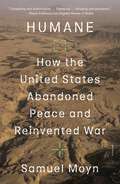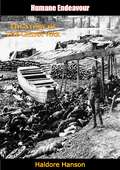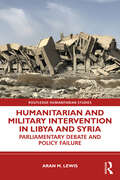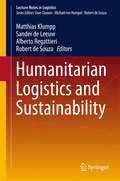- Table View
- List View
Hullo Russia, Goodbye England
by Derek RobinsonFlight Lieutenant Silk, a twice-decorated Lancaster pilot in WW II, rejoins the R.A.F. and qualifies to fly the Vulcan bomber. Piloting a Vulcan is an unforgettable experience: no other aircraft comes close to matching its all-round performance. And as bombers go, it's drop-dead gorgeous. But there's a catch. The Vulcan has only one role: to make a second strike. To act in retaliation for a Russian nuclear attack. Silk knows that knows that if he ever flies his Vulcan in anger, he'll be flying from a smoking wasteland, a Britain obliterated. But in the mad world of Mutually Assured Destruction, the Vulcan is the last - the only - deterrent. Derek Robinson returns with another rip-roaring, gung-ho R.A.F. adventure, one that exposes and confronts the brinkmanship and sabre-rattling of the Cold War Era.
Hullo Russia, Goodbye England
by Derek RobinsonFlight Lieutenant Silk, a twice-decorated Lancaster pilot in WW II, rejoins the R.A.F. and qualifies to fly the Vulcan bomber. Piloting a Vulcan is an unforgettable experience: no other aircraft comes close to matching its all-round performance. And as bombers go, it's drop-dead gorgeous. But there's a catch. The Vulcan has only one role: to make a second strike. To act in retaliation for a Russian nuclear attack. Silk knows that knows that if he ever flies his Vulcan in anger, he'll be flying from a smoking wasteland, a Britain obliterated. But in the mad world of Mutually Assured Destruction, the Vulcan is the last - the only - deterrent. Derek Robinson returns with another rip-roaring, gung-ho R.A.F. adventure, one that exposes and confronts the brinkmanship and sabre-rattling of the Cold War Era.
The Human Body
by Anne Milano Appel Paolo GiordanoFrom the bestselling author of The Solitude of Prime Numbers, a searing novel of war and the journey from youth into manhood In Paolo Giordano's highly awaited new novel, a platoon of young men and one woman soldier leaves Italy for one of the most dangerous places on earth. Forward Operating Base (FOB) in the Gulistan district of Afghanistan is nothing but an exposed sandpit scorched by inescapable sunlight and deadly mortar fire. Each member in the platoon manages the toxic mix of boredom and fear that is life at the FOB in his own way. Brash Cederna shamelessly picks on the virgin Ietri. Giulia Zampieri seemingly navigates this male-dominated world with ease--until two male comrades start vying for her attention. And for medical officer Alessandro Egitto, the FOB serves as an escape from a real life even more dangerous than one fought with guns. At night, lying on their beds, they feel the beat of their own hearts, the ceaseless activity of the human body. But when a much-debated mission goes devastatingly awry, the soldiers find their lives changed in an instant. A heartrending, redemptive story about brotherhood and family, modern war and the wars we wage with ourselves, Paolo Giordano's visceral novel reminds us what it is to be human.
The Human Body
by Paolo Giordano Anne Milano AppelFrom the bestselling author of The Solitude of Prime Numbers, a searing novel of war and the journey from youth into manhood A heartrending, at times darkly comic but ultimately redemptive novel, Paolo Giordano's The Human Body is an exploration of brotherhood and family, of modern war and the wars we wage within ourselves. It is a novel that reminds us of what it means to be human.A platoon of young men and a single woman leave Italy for one of the most dangerous places on earth. At their forward operating base in Afghanistan--an exposed sandpit scorched by inescapable sunlight and mortar fire--this band of inexperienced soldiers navigates the irreversible journey from youth to adulthood. But when a much-debated mission goes devastatingly awry, their lives are changed in an instant. And on their return home, they will confront the most difficult challenge of all: to create a life worth living. From the Trade Paperback edition.ly awry, the soldiers find their lives changed in an instant. A heartrending, redemptive story about brotherhood and family, modern war and the wars we wage with ourselves, Paolo Giordano's visceral novel reminds us what it is to be human.
The Human Body in the Age of Catastrophe: Brittleness, Integration, Science, and the Great War
by Stefanos Geroulanos Todd MeyersThe injuries suffered by soldiers during WWI were as varied as they were brutal. How could the human body suffer and often absorb such disparate traumas? Why might the same wound lead one soldier to die but allow another to recover? In The Human Body in the Age of Catastrophe, Stefanos Geroulanos and Todd Meyers uncover a fascinating story of how medical scientists came to conceptualize the body as an integrated yet brittle whole. Responding to the harrowing experience of the Great War, the medical community sought conceptual frameworks to understand bodily shock, brain injury, and the vast differences in patient responses they occasioned. Geroulanos and Meyers carefully trace how this emerging constellation of ideas became essential for thinking about integration, individuality, fragility, and collapse far beyond medicine: in fields as diverse as anthropology, political economy, psychoanalysis, and cybernetics. Moving effortlessly between the history of medicine and intellectual history, The Human Body in the Age of Catastrophe is an intriguing look into the conceptual underpinnings of the world the Great War ushered in.
The Human Comedy
by William SaroyanA warm and captivating story of an American family in wartime, and in particular, of Homer Macauley, the fastest telegraph messenger in the San Joaquin valley.
Human Factors in Effective Counter-Terrorism: A Comparative Study (Routledge Advances in Defence Studies)
by Richard WarnesThis book seeks to provide a comparative assessment of the significance of ‘human factors’ in effective counter-terrorism. The phrase ‘human factors’ is used to describe personal relationships, individual capabilities, effective leadership, technical interface, organisational culture and the community engagement necessary to effectively minimise, counter and control the threat of terrorism. Unlike many works in the field, this book is constructed around the input of ‘experienced knowledge’ from over 170 semi-structured interviews of specialist military, policing, intelligence and security practitioners - those actors actually involved in countering terrorism. These practitioners come from seven countries – the United Kingdom, Ireland, France, Spain, Israel, Turkey and the United States – all of which have suffered over the years from different types of terrorist threat and responded with a mixture of counter-terrorist measures. Where military practitioners also discussed overseas counter-insurgency measures, that material has been included, since terrorism forms a key aspect of such wider insurgencies. The resulting interview data was analysed through a variant of ‘Grounded Theory’ to identify key emerging themes and issues, both positive and negative, relevant to ‘human factors’ in the individual countries and more generically. This book incorporates the informed operational experiences and insights of the interviewees while seeking to provide examples of successful counter-terrorist measures at the strategic, operational and tactical levels. This book will be of much interest to students of counter-terrorism, defence studies and security studies in general.
The Human Factors of Fratricide (Human Factors in Defence)
by Laura A. Rafferty Neville A. StantonFratricide has been defined as firing on your own forces, when mistaking them for enemy forces, which results in injury or death. Rates of fratricide incidence have been steadily increasing and the complexity of the contemporary operating environment may lead to a continuation of this trend. Although the majority of research into fratricide has focused on the development of technological decision aids, recent explorations highlight the need to emphasise the social aspects within a socio-technical framework. This book presents and validates, via the use of case studies, a model of teamwork and decision-making factors that are associated with incidents of fratricide. In summary, it offers a review and evaluation of contemporary theoretical perspectives on teamwork and fratricide, as well as a range of accident analysis approaches. A novel theory of fratricide is then presented followed by a new methodology for assessing fratricide. Naturalistic case studies of teams are undertaken in the military domain. These studies illustrate the approach and offer early validation evidence. In closing, the book presents a series of principles designed to reduce the likelihood of fratricide in the future.
Human Game
by Simon ReadIn March and April of 1944, Gestapo gunmen killed fifty POWs--a brutal act in defiance of international law and the Geneva Conventions. This is the true story of the men who hunted them down. The mass breakout of seventy-six Allied airmen from the infamous Stalag Luft III became one of the greatest tales of World War II, immortalized in the film The Great Escape. But where Hollywood's depiction fades to black, another incredible story begins . . . Not long after the escape, fifty of the recaptured airmen were taken to killing fields throughout Germany and shot on the direct orders of Hitler. When the nature of these killings came to light, Churchill's government swore to pursue justice at any cost. A revolving team of military police, led by squadron leader Francis P. McKenna, was dispatched to pick up a trail long gone cold. Amid the chaos of postwar Germany, divided between American, British, French, and Russian occupiers, McKenna led a three-year manhunt that brought twenty-one Gestapo killers to justice. In Human Game, Simon Read delivers a clear-eyed and meticulously researched account of this often overlooked saga of hard-won justice. INCLUDES PHOTOS
Human Game: The True Story Of The 'great Escape' Murders And The Hunt For The Gestapo Gunmen
by Simon ReadIn March 1944, 76 Allied officers tunnelled out of Stalag Luft III. Of the 73 captured, 50 were shot by direct order of Hitler. This is the story of how a British Bobby from Blackpool, Frank McKenna, was sent to post-war Germany on the express orders from Churchill to bring the Gestapo murderers to justice. In a quest that ranges from the devastated, bombed out cities of Europe to the horrors of the concentrations camps, McKenna is relentless in his pursuit. A gripping read set in the aftermath of World War II.
Human Nature and the Causes of War
by John David OrmeWhat are the causes of war? Wars are generally begun by a revisionist state seeking to take territory. The psychological root of revisionism is the yearning for glory, honor and power. Human nature is the primary cause of war, but political regimes can temper or intensify these passions. This book examines the effects of six types of regime on foreign policy: monarchy, republic and sultanistic, charismatic, and military and totalitarian dictatorship. Dictatorships encourage and unleash human ambition, and are thus the governments most likely to begin ill-considered wars. Classical realism, modified to incorporate the impact of regimes and beliefs, provides a more convincing explanation of war than neo-realism.
Human Performance Modification
by Board on Behavioral, Cognitive, and Sensory Sciences Division of Behavioral and Social Sciences and Education National Research Council Division on Engineering and Physical Sciences Committee on Assessing Foreign Technology Development in Human Performance ModificationThe development of technologies to modify natural human physical and cognitive performance is one of increasing interest and concern, especially among military services that may be called on to defeat foreign powers with enhanced warfighter capabilities. Human performance modification (HPM) is a general term that can encompass actions ranging from the use of "natural" materials, such as caffeine or khat as a stimulant, to the application of nanotechnology as a drug delivery mechanism or in an invasive brain implant. Although the literature on HPM typically addresses methods that enhance performance, another possible focus is methods that degrade performance or negatively affect a military force's ability to fight. Advances in medicine, biology, electronics, and computation have enabled an increasingly sophisticated ability to modify the human body, and such innovations will undoubtedly be adopted by military forces, with potential consequences for both sides of the battle lines. Although some innovations may be developed for purely military applications, they are increasingly unlikely to remain exclusively in that sphere because of the globalization and internationalization of the commercial research base. Based on its review of the literature, the presentations it received and on its own expertise, the Committee on Assessing Foreign Technology Development in Human Performance Modification chose to focus on three general areas of HPM: human cognitive modification as a computational problem, human performance modification as a biological problem, and human performance modification as a function of the brain-computer interface. Human Performance Modification: Review of Worldwide Research with a View to the Future summarizes these findings.
Human Resource Management in the British Armed Forces: Investing in the Future
by Richard Holmes Richard Bartle Alex AlexandrouThis study of the future of human resource management in the British armed forces considers the impace of the Human Rights Act 1998 and the Macpherson report. It covers ethnic minorities and gay rights as well as other challenging human resource issues.
Human Resources (Fiction Without Frontiers)
by Robin TriggsThe sequel to Night Shift, praised by Crime Review and Cemetery Dance.Antarctica. A city on the edge of nowhere.Anders Nordvelt is chief of security in this frozen land, so, when a prominent member of a dissident group is murdered, it is his job to find the killer. Unsatisfied with the obvious explanation, Anders keeps pushing until the body of a colleague turns up in his apartment. Could Anders really be the killer? Why does he half-remember wielding the knife? And why are the whispers of a fabled Human Resources black-ops team getting ever louder?As for Anders, he&’s about to enter a deadly game of cat-and-mouse with a ruthless killer.FLAME TREE PRESS is the new fiction imprint of Flame Tree Publishing. Launched in 2018 the list brings together brilliant new authors and the more established; the award winners, and exciting, original voices.
Human Rights and America's War on Terror (Routledge Research in Human Rights Law)
by Satvinder S. JussThis volume examines the success of the 9/11 attacks in undermining the cherished principles of Western democracy, free speech and tolerance, which were central to US values. It is argued that this has led to the USA fighting disastrous wars in Afghanistan and Iraq, and to sanctioning the use of torture and imprisonment without trial in Guantánamo Bay, extraordinary rendition, surveillance and drone attacks. At home, it has resulted in restrictions of civil liberties and the growth of an ill-affordable military and security apparatus. In this collection the authors note the irony that the shocking destruction of the World Trade Center on 9/11 should become the justification for the relentless expansion of security agencies. Yet, this is a salutary illustration of how the security agencies in the USA have adopted faulty preconceptions, which have become too embedded within the institution to be abandoned without loss of credibility and prestige. The book presents a timely assessment of both the human rights costs of the ‘war on terror’ and the methods used to wage and relentlessly continue that war. It will be of interest to researchers, academics, practitioners and students in the fields of human rights law, criminal justice, criminology, politics and international studies.
Human Rights and Counter-terrorism in America's Asia Policy (Adelphi series)
by Rosemary FootThis book examines the effects of the terrorist attacks on New York and Washington of 11 September 2001 on America's human rights and counter-terrorism policies towards a number of countries in Asia. Five countries have been chosen for examination, divided into two front-lines states (Pakistan and Uzbekistan), two second-front countries (Indonesia and Malaysia), and a third-front country, China. The paper also looks at changes in US domestic legislation and its treatment of prisoners at Guantanamo Bay and elsewhere in order to analyse the extent to which the US promotion of an external human rights policy might also have been compromised by its own legislative changes as a result of the struggle against terrorism. The paper concludes that the attacks on US territory, overall, have constrained America's willingness and capacity to promote an external human rights policy with respect to these five countries. However, some attention - especially at the rhetorical level - to these countries' human rights records has been retained to differing degrees among the five states. This degree of difference is not explained entirely in reference to a country's perceived centrality to the struggle against terrorism. It depends on the extent to which the US executive and legislative branches are united - either singly or in combination - in their disapproval of a state's record, or in their understanding about how best to reach the policy goals that are sought.
Human Rights in Armed Conflict: Law, Practice, Policy
by Gerd OberleitnerIt is now widely accepted that international human rights law applies in situations of armed conflict alongside international humanitarian law, but the contours and consequences of this development remain unclear. This book revisits, organizes and contextualizes the debate on human rights in armed conflict and explores the legal challenges, operational consequences and policy implications of resorting to human rights in situations of inter- and intra-state violence. It presents the benefits and the drawbacks of using international human rights law alongside humanitarian law and discusses how the idea, law and policy of human rights influence the development of the law of armed conflict. Based on legal theory, policy analysis, state practice and the work of human rights bodies it suggests a human rights-oriented reading of the law of armed conflict as feasible and necessary in response to the changing character of war.
Human Rights Law and Counter Terrorism Strategies: Dead, Detained or Stateless (Routledge Research in Terrorism and the Law)
by Diane WebberIn 2006, the United Nations urged Member States to ensure that counter terrorism policies guaranteed respect for human rights and the rule of law. This book demonstrates that, in many cases, counter terrorism policies relating to preventive detention, targeted killing and measures relating to returning foreign terrorist fighters have failed to respect human rights, and this encourages vulnerable people to be drawn towards supporting or committing acts of terrorism. Furthermore, in recent years, jurisprudence and public opinion in some countries have shifted from being at one stage more protective of human rights, to an acquiescence that some particularly draconian counter terrorism methods are necessary and acceptable. This book analyzes why this has happened, with a focus on the United States, United Kingdom, and Israel, and offers suggestions to address this issue. The work will be essential reading for students, academics and policy-makers working in the areas of human rights, humanitarian law, and counter terrorism.
Human-Robot Interactions in Future Military Operations (Human Factors in Defence)
by Florian JentschSoldier-robot teams will be an important component of future battle spaces, creating a complex but potentially more survivable and effective combat force. The complexity of the battlefield of the future presents its own problems. The variety of robotic systems and the almost infinite number of possible military missions create a dilemma for researchers who wish to predict human-robot interactions (HRI) performance in future environments. Human-Robot Interactions in Future Military Operations provides an opportunity for scientists investigating military issues related to HRI to present their results cohesively within a single volume. The issues range from operators interacting with small ground robots and aerial vehicles to supervising large, near-autonomous vehicles capable of intelligent battlefield behaviors. The ability of the human to 'team' with intelligent unmanned systems in such environments is the focus of the volume. As such, chapters are written by recognized leaders within their disciplines and they discuss their research in the context of a broad-based approach. Therefore the book allows researchers from differing disciplines to be brought up to date on both theoretical and methodological issues surrounding human-robot interaction in military environments. The overall objective of this volume is to illuminate the challenges and potential solutions for military HRI through discussion of the many approaches that have been utilized in order to converge on a better understanding of this relatively complex concept. It should be noted that many of these issues will generalize to civilian applications as robotic technology matures. An important outcome is the focus on developing general human-robot teaming principles and guidelines to help both the human factors design and training community develop a better understanding of this nascent but revolutionary technology. Much of the research within the book is based on the Human Research and Engineering Directorate (HRED), U.S. Army Research Laboratory (ARL) 5-year Army Technology Objective (ATO) research program. The program addressed HRI and teaming for both aerial and ground robotic assets in conjunction with the U.S. Army Tank and Automotive Research and Development Center (TARDEC) and the Aviation and Missile Development Center (AMRDEC) The purpose of the program was to understand HRI issues in order to develop and evaluate technologies to improve HRI battlefield performance for Future Combat Systems (FCS). The work within this volume goes beyond the research results to encapsulate the ATO's findings and discuss them in a broader context in order to understand both their military and civilian implications. For this reason, scientists conducting related research have contributed additional chapters to widen the scope of the original research boundaries.
Human Smoke: The Beginnings of World War II, the End of Civilization
by Nicholson BakerBestselling author Nicholson Baker, recognized as one of the most dexterous and talented writers in America today, has created a compelling work of nonfiction bound to provoke discussion and controversy -- a wide-ranging, astonishingly fresh perspective on the political and social landscape that gave rise to World War II. Human Smoke delivers a closely textured, deeply moving indictment of the treasured myths that have romanticized much of the 1930s and '40s. Incorporating meticulous research and well-documented sources -- including newspaper and magazine articles, radio speeches, memoirs, and diaries -- the book juxtaposes hundreds of interrelated moments of decision, brutality, suffering, and mercy. Vivid glimpses of political leaders and their dissenters illuminate and examine the gradual, horrifying advance toward overt global war and Holocaust. Praised by critics and readers alike for his exquisitely observant eye and deft, inimitable prose, Baker has assembled a narrative within Human Smoke that unfolds gracefully, tragically, and persuasively. This is an unforgettable book that makes a profound impact on our perceptions of historical events and mourns the unthinkable loss humanity has borne at its own hand.
Human Voices of the Russian Campaign of 1812: a translation of “Etudes d’Histoire”
by Harriet M. Capes Arthur ChuquetThis ebook is purpose built and is proof-read and re-type set from the original to provide an outstanding experience of reflowing text for an ebook reader. Few French historians of the Revolutionary and Napoleonic period have the stature of Arthur Chuquet, his copious writings on the era are most penetrating and accurate. He was also a master of infusing them with a character of the men that shaped the age; this was possible only by his encyclopaedic knowledge of the memoirs and letters of the combatants, diplomats, generals of the European powers. In this translation of one of his volumes, he focusses on the experiences of the men of the Grande Armée as they march into Russia, a march that would cost so many of their lives. The vivid pictures drawn from the memoiralists are elucidated by Chuquet's notes and his tight incisive editing. Not a campaign history, but snapshots of the experiences of the high and low of the French and Allied forces; from Napoleon's aide-de-camp de Narbonne to lowly paymaster Guillaume Peyrusse. An excellent collection of memoirs. Title - Human Voices of the Russian Campaign of 1812 Sub-Title - translation of "Etudes d'Histoire" Author -- Arthur Chuquet (1853-1925) Translator -- Harriet M. Capes (???? - ????) Text taken, whole and complete, from the edition published in 1913, London, by Andrew Melrose. Original - 296 pages.
Humane: How the United States Abandoned Peace and Reinvented War
by Samuel MoynA prominent historian exposes the dark side of making war more humaneIn the years since 9/11, we have entered an age of endless war. With little debate or discussion, the United States carries out military operations around the globe. It hardly matters who’s president or whether liberals or conservatives operate the levers of power. The United States exercises dominion everywhere.In Humane: How the United States Abandoned Peace and Reinvented War, Samuel Moyn asks a troubling but urgent question: What if efforts to make war more ethical—to ban torture and limit civilian casualties—have only shored up the military enterprise and made it sturdier? To advance this case, Moyn looks back at a century and a half of passionate arguments about the ethics of using force. In the nineteenth century, the founders of the Red Cross struggled mightily to make war less lethal even as they acknowledged its inevitability. Leo Tolstoy prominently opposed their efforts, reasoning that war needed to be abolished, not reformed—and over the subsequent century, a popular movement to abolish war flourished on both sides of the Atlantic. Eventually, however, reformers shifted their attention from opposing the crime of war to opposing war crimes, with fateful consequences.The ramifications of this shift became apparent in the post-9/11 era. By that time, the US military had embraced the agenda of humane war, driven both by the availability of precision weaponry and the need to protect its image. The battle shifted from the streets to the courtroom, where the tactics of the war on terror were litigated but its foundational assumptions went without serious challenge. These trends only accelerated during the Obama and Trump presidencies. Even as the two administrations spoke of American power and morality in radically different tones, they ushered in the second decade of the “forever” war.Humane is the story of how America went off to fight and never came back, and how armed combat was transformed from an imperfect tool for resolving disputes into an integral component of the modern condition. As American wars have become more humane, they have also become endless. This provocative book argues that this development might not represent progress at all.
Humane Endeavour: The Story of the China War
by Haldore HansonAs a foreign correspondent in the 1930’s, Haldore Hanson covered the Chinese civil war and the invasion of China by Japan. Traveling rural roads on bicycle, he rotated among the warring forces and was occasionally arrested by one side or the other.The present volume, “Humane Endeavor”, which was first published in 1939, was praised as a rare close-up from the remote front lines. Owing to his expertise, the State Department hired him as an official in 1942. After World War II, he became assistant director of the Point Four development aid program for Asia.“A complete coverage of the war years, with pictures of outstanding personalities. [Hanson] reports on the fall of Peiping, on war on the Mongel front, on the sieges of Shanghai, Nanking, on Japanese atrocities, war in the air, finance and man power, Japanese rule in conquered areas, guerilla warfare, border republics, [and] experiences with the 8th Route Army. Interesting reading it holds the interest throughout, and has the vitality of a first-hand record.”—Kirkus Review
Humanitarian and Military Intervention in Libya and Syria: Parliamentary Debate and Policy Failure (Routledge Humanitarian Studies)
by Aran M. LewisThis book explores the contradictions in Britain’s humanitarian and military intervention in Libya and Syria, beginning with the Arab spring in 2010. The book assesses the contradictions between the expressed humanitarian intentions of British military interveners and the impact of their actions on the putative beneficiary states. It demonstrates that, as a result of foreign intervention, both Libya and Syria were rendered non-functional as unitary nations and suffered extensive harm to their people and infrastructure. To evaluate the effectiveness and credibility of humanitarian warfare, the author conducts a thematic analysis of debates on Libya and Syria in the House of Commons. The book provides a detailed study of intentions and motives expressed by Members of Parliament, of consequent British state actions and their outcomes, and of MPs’ reactions to outcomes. It provides ample evidence of duplicity, insincerity, indifference to harm, and ulterior motives for violence that undermine moral claims and support the argument that, although humanitarian warfare may be possible, the leading Western activist states (Britain, France, and the USA) are poorly qualified to carry it out. Illustrating a systemic failure of strategy and accountability in British foreign policy, this book will be of interest to scholars and graduates of Humanitarian Studies, International Relations and Military Studies.
Humanitarian Logistics and Sustainability
by Matthias Klumpp Sander Leeuw Alberto Regattieri Robert SouzaThis contributed volume combines conceptual and strategic research articles dealing with the "why" and "to what end" of sustainable operations in humanitarian logistics, as well as operational research contributions regarding the "how" from the United Nations as well as from researchers and organizations from different countries (Germany, Australia, Singapore, Netherlands, Italy, Denmark, Jordan). The target audience primarily comprises research experts, decision makers and practitioners in the field, but the book may also be beneficial for graduate students.
